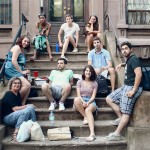How can we have homogenous, happy flourishing communities?
I live in a populated area of North London. After five years, and until a little over a year ago, I didn’t know any of my neighbours. Then in the autumn of 2014, some local organisation put together a month long festival of activities in my area, there were lectures, presentations, fun evening social activities. It became ALIVE! And I met some people, who introduced me to others…. and now I feel a part of the community.
One of the keys to our area reviving was having places to do things in. At the time, a new temporary “community centre” had been set up. It was a space for the residents to use to have meetings, educational events, whatever we wanted… I realized how much I had missed being able to stay around where I live, get to know the people around me, and it gave me the inspiration to help set up community events in MY area.
You have to be the change that you want to see in the world. Gandhi
I took Ghandhi’s words to heart and launched some community events, advertising in a social media in my local area. The people who came were from around here and through our meetings and common interests, they began to know each other and create friendships, even intergenerational friendships.
It doesn’t come easily. In the “days of old” people knew each other from birth, from being in the same village or small area of town, but in London, people are coming and going all the time and it is difficult. So it takes effort and it requires space, or a space to have activities in. It can be a garden where people join together in “guerrilla gardening”, it can be a small local gym that will keep the youth happy, it can be a place to show documentaries, to have parents meetings, painting classes, community spaces are needed. Then the communities themselves can organise events according to their needs and their interests. It does take someone, or a few “someones” taking the lead in different areas, but isn’t contribution one of the keys to fulfilment?
While greater community interaction will help community adhesion, conflict is often rampant in London communities. Poor sound insulation seems to be a number one cause of conflict especially in the council estates, but there are also disputes over parking, over common spaces, as well as gatherings of youths. The problems are multiple and the councils are often unable to tackle the issues being themselves insufficiently trained in handling conflict.
Ideally, all councils and areas should have conflict resolution consultants. Some boroughs do, they train and employ local volunteers for community mediation. It seems to me that it is an excellent solution in these days of cuts and emphasis on community relations, to train the community members themselves in listening skills. The earlier the conflict is addressed, the less escalation there is.
Different people react differently to aggravation, perceived unfairness or provocation. When someone is upset, they need to talk and feel heard and they need to know that someone is REALLY listening and that person has empathy towards them.
The biggest problem with communication is that we do not listen to understand, we listen to reply– Marshall Rosenberg, creator of Non Violent Communication.
It seems then that our communities could greatly benefit from a community conflict resolution centre, staffed with trained volunteers. Perhaps this could be under the roof of the great community centre every community should have. Not only the communities would benefit overall but the families whose members were trained in conflict resolution, the youth could partake of the training and help make their community a safe and happy place.
Our survival as a species depends on our ability to recognise that our well being and the well being of others are in fact one and the same. M. Rosenberg
Antonia is a Conflict Coach

